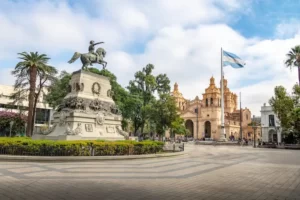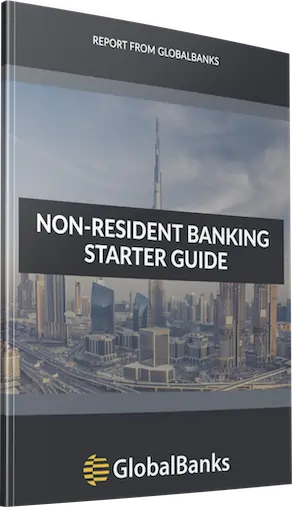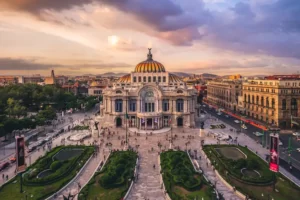
Open Argentina Bank Account Online: Opening in Argentina
A foreign non-resident can open an Argentina bank account online as long as they meet the bank’s requirements and have a suitable client profile.
How to Open International Bank Accounts for Non-Residents

Download Your Free Copy:
Non-Resident Banking Guide
Our Step-by-Step Formula for Non-Resident Bank Account Opening
Opening bank accounts as a non-resident has never been more important, or more difficult...
In this article, you'll get the same powerful hacks and insights that we give our GlobalBanks Insiders -- shaping the way they find, approach, apply to, and leverage offshore and international bank accounts around the world.
If you want to open bank accounts in countries where you have no ties, you need to know which banks are going to approve you, what their opening requirements are, and how to open accounts without wasting your time or money.
In fact, one of the most common questions that we get asked is “how can a non-resident open a bank account?”
And since you’re on this page, you probably have the same question!
In this article, we’re going to answer this question for you. But, that’s not all… we’ll also help you identify banks that cater to non-residents, offer the type of services that non-residents need, and even allow you to open remotely.
BUT there’s a lot that we’re not going to include in this article. Including the account opening secrets that we share in our “Non-Resident Banking Starter Guide.”
Being able to open an account as a non-resident depends on a number of important factors. To get you started, we’re going to cover the most common factors below.
First, lets talk about where you want to open:
What “ties” do you have with that country, what plans do you have to be there, and what are your reasons for wanting to open the account. These are all important considerations.
But, you also need to consider yourself:
Who you are, where you come from, and even your nationality all play an important role when you want to bank as a non-resident. It might be unfortunate, but it’s true that banks will discriminate based on these and other factors.
Can you meet the requirements?
Whether or not you can meet a banks requirements will determine where you can open. But, there’s good news. Everyone can almost always open accounts as a non-resident. You just need to know where to look and how to apply.
So, why is opening a non-resident bank account so difficult?
Most of the time, banks don’t openly advertise that they accept non-residents. There are lots of reasons for this. Not the least of which is they don’t want to attract customers that are going to cause extra headaches for compliance.
But, if you know which banks to approach and how to apply for the right bank accounts (even with the right banker), you can navigate the non-resident bank account opening process.
And that’s what we’re going to cover below…

Why do so many sophisticated investors and business owners want to open non-resident bank accounts?
Do they know something you don’t? Maybe they just know where to go for the best banking options.
You see, in many western countries, domestic banks are underperforming on nearly every metric. Whether you’re comparing balance sheets or management practices.
Domestic banks seem to be over-leveraged and take riskier decisions than the offshore alternatives. Offshore banks, meanwhile, appear to be safer, and financially sound.
In other words, the right non-resident bank account can provide you with better protection and a broader variety of banking services than those available in most developed countries.
Safe banks are the byproduct of safe banking systems.
Singapore, for example, has never had a bank failure… ever. And that’s mainly due to the fact that Singapore’s banking sector is very well-managed and is fiscally responsible. But Singapore is only one example of many.
Sound banking systems legally require banks operating within their borders to be financially healthy and be fiscally responsible.
Such banks can’t carelessly spend depositor funds. They have to have certain capitalization and liquidity rates. Banks that don’t follow the rules lose their banking licenses and cease to exist.
In reality, while Hollywood, the media, and government agencies would like you to believe international and offshore banking is unsophisticated and shady, it’s actually the opposite.
Since many offshore jurisdictions rely heavily on offshore financial services, it’s critical that their banks are fully compliant, efficiently operated, and regulated in a manner that is sustainable and makes financial sense.
After all, one banking scandal can ruin the entire economy. So regulators, bank owners, managers, and employees all have a vested interest to make sure that everything continues to work properly and legally.
If you compare that sort of environment to the scandals, money laundering, and horrible financial state of banks in many western countries, such as US, UK, Canada, or Europe, you’d be right to start opening accounts overseas.
One of the fastest growing reasons that people looking to open international and offshore bank accounts is the poor level of customer service that they receive from banks in their home country.
In fact, customer service is often non-existent. The only time you ever get attention from the bank is if they flag a transaction and have questions for you.
But service isn’t just about being treated like a customer. It also comes down to what you’re being offered… or not offered.
Offshore banks are still competing for your business. These banks value their customers and recognize that having satisfied customers is crucial to the long-term success of their bank– and that is significant!
Unlike banks that operate in densely populated locations like the US or Europe, international banks actually have to attract your business. That tends to result in better service, greater attention to detail, and more responsive support.
Nobody wants their funds to be deposited in a bank that pays mediocre interest. Yet, for many of us, the banks in our home countries don’t give us a choice.
The sad fact is that without an interest rate that (at the very least) meets inflation, your money is losing buying power every single year.
Contrary to what you can get at local banks in most developing nations, there are international banks around the world offering even higher rates.
In some cases, you can even find competitive one-year interest rates above 5 percent.
And if you’re looking to deposit for longer, you can easily capture up to 5% on USD deposits (in USD based economies) outside of the US. Yes, it exists!
At this point, you might be wondering, “what do I have to give up to get higher interest rates”?
The simple answer is that you don’t have to give up anything. In fact, you’re probably going to gain a lot of benefits! Better service and greater security for your money.
Of course, if you intend to open accounts in local currencies, you need to be careful… after all, banks are willing to pay higher interest rates to attract depositors for a reason!
For example: In Mongolia, you’ll see fixed deposits in US dollars for about 5%. But, fixed deposits in the local currency, the Mongolian Tugrik, can fetch 13-15%.
While these double-digit rates look attractive on the surface, the inflation rate in the country is also high and the currency is volatile. So even if you don’t plan on spending in Tugriks, you could lose a lot of value in USD terms.
Diversifying your bank accounts can offer a lot of benefits. You will end up with backup accounts, a range of different interest rates, and even different currencies.
But that can sometimes come at a cost. So you need to make sure you fully understand the fee structure of the bank accounts you’re opening before you apply.
That said, in some instances having international and offshore bank accounts can actually reduce your costs!
This is true both in terms of reduced foreign exchange fees but it can also help protect your money from unpredictable currency swings.
With this in mind, an international or offshore bank is one of the best ways to access cost-effective currency diversification.
In most banking hubs, you can select a wide variety of foreign currencies, from developed economies to emerging markets. And you can hold them much more affordable than in your home country.
In fact, it’s not unusual for offshore banks to offer multi-currency accounts by default. This means that you can hold a number of currencies free of charge.
In some cases you can even hold up to ten or more currencies with a single offshore bank.
This not only reduces the risk, but also increases the chances of being able to respond quickly when you see opportunities or risks on the horizon.



If you’re ready to start benefiting from the offshore banking world as a non-resident then the next step is to open a non-resident offshore account.
To help you get started, we’re giving you our Non-Resident Banking Starter Guide for FREE right now… but this is a limited time offer. So grab it while it’s available!
To help you accomplish steps 1 through 3, we have prepared a premium report called the “International Banking Blueprint,” which goes through the most important considerations for your banking strategy, the specific countries, and the specific banks & services that non-residents can use!
How you use these strategies and actually get started is going to depend on who you are, where you’re from, and how much money you have.

It’s important to understand that you’ll undoubtedly face some issues when opening accounts as a non-resident.
The world may be more linked than ever before, however, regulations are increasing and opening accounts is becoming much harder.
In fact, today, banks are unable to keep up with the ever-increasing demands of regulators and the increasing compliance burden that they’re being asked to carry.
The problem is that most people don’t know the new rules of the game.
It usually goes like this…
They go in blind. Choose the wrong bank. Carelessly slap together application answers. And don’t take the application process seriously.
So they don’t understand the bank’s sensitivities, likes and dislikes, account opening quirks, or the best strategies to use.
And what’s the end result?
Their application to open a bank account as a non-resident gets denied!
As a prospective client at a bank, it’s your job to make the bank comfortable and convince them that they want to serve your needs.
After all, whether you’re opening a bank account or sitting down at a restaurant, everyone appreciates a client that is easy to serve.
To get the best possible bank accounts open you need to be pragmatic. Understand the system and the players.
Work with bankers and make life easy for the compliance team. Make it easy for them to “tick” their boxes. After all, they’re not the enemy. They’re just trying to do what regulators tell them and avoid being penalized.
In other words, don’t go into the process thinking you are entitled to a bank account and that the bank you choose will automatically accept all non-residents– they won’t!
Certain branches might cater to certain industries, prefer certain client types, require particular minimums, or have varying degrees of openness towards non-residents.
Knowing your bank and branch’s preferences and sensitivities beforehand is key, especially if you’re not planning to make an initial six-figure deposit.
In other words, unless you know which banks and branch (and even banker) to speak with, you could very quickly find yourself wasting a lot of time and money trying to open an account.
So you need to prepare carefully and strategically before setting foot in a bank or interacting with bankers.
You need to clearly understand your non-resident banking goals. And you need to know the benefits that you’re actually after.
That means you need to be aware of the risks and disadvantages of the bank, bank account, and more.
You know, those little, hidden “cons” that no one talks about– like hidden fees, internal policies, restrictions, and compliance quirks.
And that’s where we come in…

Over the years, we’ve seen a growing number of banks in traditional banking jurisdictions making moves to meet the needs of non-residents from around the world.
These international and offshore banks often tailor their offerings to appeal to the very unique needs of their non-resident and international clients.
But it’s important to note that the country you choose to bank in is as important as deciding where to live, or where to buy an investment property.
You wouldn’t buy a house or move your family to a war-torn neighborhood. So don’t put your money there!
That’s why our analysts have spent thousands of hours analyzing banks, speaking to bankers, digging through paperwork– all to identify the best banks and countries for you to open accounts!
We talk to bankers, regulators, compliance officers, economists, advisors, and, of course current customers to understand what’s really going on behind closed doors, inside of the world’s most secretive industries.
Through our research, we’ve discovered several banks in multiple jurisdictions that are hidden gems and will open accounts for non-residents from pretty much every country.
Yes…opening an international or offshore bank account as a non-resident can be complex. But, we’re going to simplify it for you.
We do this through our premium membership platforms.
If you’re a non-resident but you’re not a GlobalBanks member and you’re ready to start opening bank accounts, you’re only a few clicks away from having all the information and tools you need at your fingertips.
When you join GlobalBanks, you get instant access to our archive of Banking Intelligence Reports including proven strategies for opening accounts all over the world, details on bank preferences and sensitivities, customer case studies, and information on what not to do.
You also get access to the GlobalBanks Database which includes easy-to-digest bank profiles, analyst insights, account opening contacts, and unique opportunities at over 250 banks in 50+ countries.
PLUS, if you choose to become a GlobalBanks USA or GlobalBanks Insider, you’ll also receive real-time analyst support including direct banker introductions.
The only question is, are you ready to start opening accounts?
Click below to learn more about GlobalBanks and to see all the tools you will immediately access.
We help you every step of the way.
Get access to the tools, intelligence, and key contacts you need to instantly access international & offshore banks as a non-resident, open bank accounts, and avoid expensive mistakes today.


If you’re not ready to unlock the power of GlobalBanks, you can still access more great content from GlobalBanks for free.
Below is a selection of our free articles, all focused on helping your business access more benefits, make more money, and protect your cash through offshore & international banks.

A foreign non-resident can open an Argentina bank account online as long as they meet the bank’s requirements and have a suitable client profile.

If you’re trying to figure out how to open a Brazilian bank account as a foreign non-resident, you’ve come to the right place. In this article, we’re going to tell you exactly who can (and can’t) open Brazilian bank accounts

Foreign non-residents can open Mexican bank accounts online if they meet the banks account opening requirements and have a suitable client profile.
Sorry, but you cannot copy the content on this page.
Javascript not detected. Javascript required for this site to function. Please enable it in your browser settings and refresh this page.